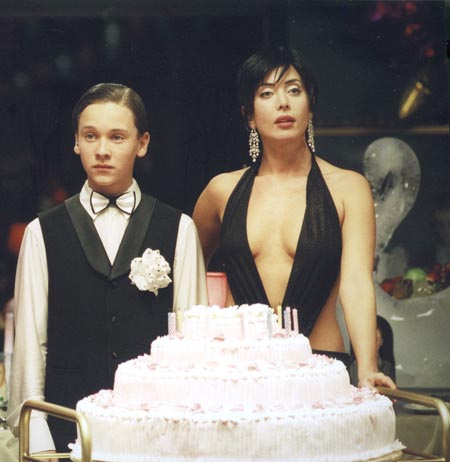

Reviews of Recent Independent, Foreign, & Documentary Films in Theaters and DVD/Home Video
Directed by: Timur Bekmambetov. Written by: Sergei Lukyanenko, Bekmambetov & Alexander Talal, based on the novel by Lukyanenko & Vladimir Vasiliev. Produced by: Konstantin Ernst & Anatoly Maximov. Director of Photography: Sergei Trofimov. Edited by: Dmitri Kiselev. Music by: Yuri Poteyenko. Released by: Fox Searchlight. Language: Russian with English subtitles. Country of Origin: Russia. 140 min. Rated R. With: Konstantin Khabensky, Maria Poroshina, Vladimir Menshov, Galina Tyunina, Victor Verzhbitskiy, Zhanna Friske & Dima Martynov. Sequels are usually less inspired than the films they follow. Day Watch, the second of a three-part Russian series that began in 2004, is an excellent follow-up to Timur Bekmambetov’s Night Watch, which drew more people to the theaters than any other movie, domestic or international, in the history of Russian cinema. When we last left the saga’s mythic forces, the apocalypse had been prevented by the Light Others and the Dark Others, two fairly self-explanatory archetypes who maintain a balance between good and evil. In the far distant past, both sides had agreed to a formal truce. Light would not attempt to overpower Dark and vice versa. But like most things in Russia, as Bekmambetov’s allegory suggests, what seems like a revolutionary concept becomes mired in bureaucracy. To maintain the balance, both sides created the Night Watch and the Day Watch. The Night Watch, the first film’s focus, watches over the Dark Others during the night to make sure vampires, witches, and demons don’t break the truce in even the slightest way. The Day Watch, naturally, attends to the Light Others. In about a decade since the events of the first film, the teenage son of our protagonist, Anton (Konstantin Khabensky) of the Light Others, has defected to the Dark Others. Meanwhile, Anton’s novice Night Watch partner Svetlana (Maria Poroshina) has not yet realized that she is the prophesized Great Other, who will break the ancient truce and trigger the apocalypse by attacking the Dark’s Great Other – Anton's traitorous son, Yegor (Dima Martynov). Not only that, she’s fallen in love with Anton. Suffice to say, there’s enough emotional baggage to cause several situations where the dreaded contact between Svetlana and Yegor could occur. There’s also a Chalk of Fate that can rewrite the course of the universe, an omnipotent Court that appears to be more powerful than either of the two policing forces combined, a body swap where Anton’s soul enters into the body of Olga (Galina Tyunina), another Light Other, and too many components dragged from the first film into the second to be mentioned here. Just like you wouldn’t see The Two Towers without already having watched The Fellowship of the Ring, you probably wouldn’t want to see Day Watch without having seen Night Watch. Knowing that the film would be one of Russia’s first concerted efforts to be release in international markets, subtitles became a creative element in Night Watch as much as the cinematography. The sequel garners the same typographical interest. Words vibrate on the screen in tense moments. When a character shatters through a window, the text shoots in every direction like shards of glass. Rather than the standard white or yellow that offset most color schemes, the subtitles are colored in whatever’s appropriate for that sequence: red when discussing blood, blue when rain appears.
Critics have responded to Day Watch slightly better than they did Night Watch. The criticism remains the same: “stupid,” “confused”
plot (few are fans of the sequel’s Chalk of Fate), and genre contrivances that overstay the running time. But the positive reviews have been more
glowing than they were for the original, lavishing praise on Bekmambetov for solidifying Day Watch with a richer allegory and a broader sense
of fun (watch out for a mind-bendingly funny sequence when Anton switches bodies with Olga, but still makes passionate love to Svetlana in Olga’s
body.) Zachary Jones
|